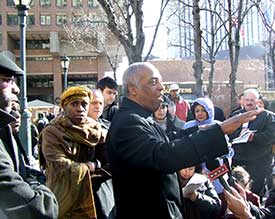As economic crisis grows
Police repression affects all workers
By
Monica Moorehead
New York
Published Dec 5, 2006 10:37 PM
The Nov. 25 police shootings of three unarmed young
African-American men in Queens, N.Y., continue to evoke
deep-seated feelings of righteous anger and distrust towards the
New York Police Department and the city administration.
|
Charles Barron speaks to the media Dec. 4
on rampant police brutality in NYC.
Viola Plummer is to his left.
WW photo: Monica Moorehead
|
Several undercover police officers emptied 50 bullets into a
moving car at 4 a.m., resulting in the death of 23-year-old Sean
Bell and the wounding of two of his friends: Joseph Guzman, shot
11 times, and Trent Benefield, shot three times. The three men
were leaving a bachelor party for Bell, who was scheduled to be
married later that same day, when they were confronted by
plain-clothes police.
Guzman and Benefield were reportedly handcuffed to their hospital
beds before they were operated on for their wounds.
These tragic shootings are the latest in a long list of deadly
police shootings of Black, Latin@ and Asian people in New York
over several decades. Similar to many other urban areas, the
police in this city are viewed as a repressive, occupying force
that follows up racial profiling with terror, especially in the
working-class communities of color.
Police who carry out acts of brutality against people of color
are very seldom brought up on felony charges, much less indicted.
District attorneys put enormous pressure on grand juries to find
some excuse to let the police off the hook.
Since the police are central to the criminal justice system, the
laws are written to protect them and not the people victimized by
them. In the case of the Nov. 25 shootings, the police involved
have been put on administrative leave but are still on the
payroll.
Black activists call for citywide
protest
On Dec. 4, leaders of the Brooklyn-based December 12 Movement
along with City Councilperson Charles Barron held a press
conference at One Police Plaza, the headquarters of the NYPD. The
main purpose of this event was to announce the first in a series
of protests to “Resist Fascism and the Rise of the American
Police State,” to be held Dec. 6 at One Police Plaza.
Attorney Roger Wareham from D12 stated that the protest had been
planned for a month in response to increased complaints of police
abuse. He characterized Bell’s death as an
“execution.” The protest will demand the firing of
Police Commissioner Raymond Kelly and Assistant Police Chief
Anthony J. Izzo, head of the NYPD’s Organized Crime Control
Bureau.
Councilperson Barron spoke on how the city is running out of
chances to stop an angry explosion of Black people, who are fed
up with police brutality. Barron recalled the many Black people
who have been killed by the cops but never received any kind of
justice—that is, no police were sent to
jail—including Eleanor Bumpurs, Malcolm Ferguson, Timothy
Stansbury Jr., Amadou Diallo and Patrick Dorismond.
Barron answered critics who stated that the shootings of Bell,
Guzman and Benefield were not racially motivated because two of
the cops involved were also Black. “The victims’
having Black skin makes the shootings racist. Race is alive and
well in New York City,” he said.
He went on to say that just because certain Black people hold
high positions, like U.S. Supreme Court Justice Clarence Thomas
or former NYPD Police Commissioner Benjamin Ward, doesn’t
mean that institutionalized racism is over. Barron called for all
grand juries that focus on police killings to be made public.
Viola Plummer, a leader of D12 and a former political prisoner,
stated, “Unless the people take over the reins of power on
a federal, state and local level, the fascistic nature of the
state will not abate.” She also talked about how the
so-called war on terror was just another excuse to target
Muslims, Arabs and South Asians along with Black, Latin@, poor
and working people.
Police repression and economic crisis
The Nov. 25 shootings not only impacted the lives of Bell, Guzman
and Benefield and their families and friends but the larger Black
community throughout every borough in New York.
Gentrification is deepening in Harlem and Brooklyn, driving out
the poor to make room for the wealthy and affluent; unemployment
and underemployment are intensifying poverty and despair,
especially for young people, with the unemployment rate for young
Black men in New York close to 50 percent; students of color are
dropping out of school at astronomical rates while the police
treat them like criminals; hospitals and clinics are closing
their doors, especially in the poorest areas. It is no
coincidence that police brutality and occupation have become even
more omnipresent.
These deplorable conditions are part of the overall assault on
workers’ rights, including low wages, disappearing
pensions, little to no health care, speed-ups, layoffs, the
demonizing of immigrant workers and much more.
The police exist as an armed force separate and apart from the
people to keep order on behalf of the wealthy owners of industry,
banking and commerce. Maintaining “order” means using
all kinds of repressive measures to keep the masses down and
divided.
Poverty, racism and suffering have sown the seeds of rebellion,
as history has shown. The police and the class interests they
protect fear the rebellions that are sure to come—whether
they are in the oppressed communities or during a strike. This
makes it even more important for working people and progressive
movements to come out in solidarity with the oppressed
communities to fight against police brutality wherever it rears
its ugly head.
E-mail: mmoorehead@workers.org
Articles copyright 1995-2012 Workers World.
Verbatim copying and distribution of this entire article is permitted in any medium without royalty provided this notice is preserved.
Workers World, 55 W. 17 St., NY, NY 10011
Email:
ww@workers.org
Subscribe
wwnews-subscribe@workersworld.net
Support independent news
DONATE


